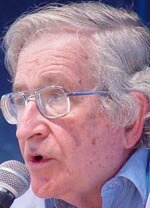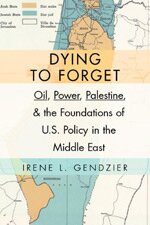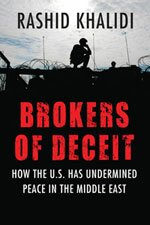Since 1901 KKL-JNF, known as Jewish National Fund (JNF) in the UK, has worked successfully for the ethnic cleansing of historic Palestine and their project has not been completed… Today sees a fresh and determined initiative to strip JNF UK of its charitable status. This effort can succeed with your help, for the JNF UK is vulnerable as never before. Whereas this racist body used to enjoy virtually automatic patronage from the leaders of all three major UK political parties, today Cameron, Clegg and Miliband have each turned their back on this openly racist ‘charity’ as being increasingly impossible to defend.
History
For more than seven decades the conflict between Israel and the Palestinian people has raged on with no end in sight, and for much of that time, the United States has been involved as a mediator in the conflict. In this book, acclaimed historian Rashid Khalidi zeroes in on the United States’s role as the purported impartial broker in this failed peace process.
Israeli archeologist Yonathan Mizrachi: “Israel wants to present the situation as if it is simply ‘borrowing’ these antiquities from the Palestinians, like it might borrow an exhibit from France or Britain. But that is not the reality in this case. It is borrowing them from the Civil Administration, which has no right to them in the first place.”
A continuous theme in … the book is the view that the Israeli-Palestinian conflict is a confrontation between the Zionist settler-colonialism and the Palestinian Arab people; it’s the last colonial war. Israel is a colonial-settler state, a result of settler colonialism and an instrument for its continuation. If one doesn’t understand this, one understands nothing about the conflict.
If an Arab state west of the Jordan is legitimate, then Zionist colonisation and its state were and are illegitimate. So by acting consistently to prevent a ‘two-state solution’ Israeli governments since 1967 were not behaving impulsively or opportunistically: they have been driven by a deep commitment to the Zionist self-legitimation of Israel itself.
The veteran Israeli socialist, Moshé Machover, has just brought out a wonderful collection of writings, chiefly his own, on the Israeli-Palestinian conflict. It is no exaggeration to say that this book is the best possible introduction to the topic for English-speaking readers. Its inestimable virtue is that it affords a historical overview of the whole Zionist enterprise, without which it is impossible to situate the struggle in any meaningful sense, much less reach a conclusion as to how it might successfully be resolved. Machover does both these things, and the result is a volume which Anglophone socialists must read.
[L]et’s face it. It isn’t that we don’t know what happened in 1947-1948. It’s that we’ve chosen not to see or hear anything that jars our thinking on the subject. Certain words and ideas have remained taboo, certain questions have been sidelined as suspect and certain histories – ours and theirs – have been excised, the better to educate us to numbness and indifference. The result is that we prefer to think of Israeli-Arab wars as instances of the much lamented ‘clashes of civilization’ that pit our civilized allies against the violence-prone ‘other,’ As long as our side wins, there is no need to look into the face of the ‘enemy,’ or to ask ourselves why and why again? Admittedly, doing so risks discovering that ‘they’ are like us, which is as disconcerting as learning that what the ‘experts’ have taught us about our history and theirs is often plain wrong, leaving us to discover that deception can be dangerous.
A new documentary by frequent IOA contributor Israeli-Canadian journalist Lia Tarachansky aims to decipher some of the anxiety that accompanies the Israeli debate over the events of 1948.
Upcoming documentary profiles Israeli journalist Lia Tarachansky’s return to the settlement where she grew up, to uncover a buried history and a landscape of denial. The film tells the stories of four veterans of the 1948 war that erased from the Israeli landscape hundreds of Palestinian villages and connects their stories to the modern-day Palestinian dispossession through the occupation and settlements.
Tzipi Livni: “The national solution for Israel’s Arabs lies elsewhere: in order to maintain a Jewish-Democratic state we must constitute two nation-states with clear red-lines. Once this happens, I will be able to come to the Palestinian citizens of Israel, whom we label Israel’s Arabs, and tell them that their national solution is elsewhere.”
Our beloved Tel Aviv, whose reputation for enlightenment and openness is world renowned, is built in part on ruined Palestinian villages – and refuses to acknowledge it.
One can conclude from Grossman’s article, probably contrary to his intent, that in theory things could have been different. In theory the occupation could have been sustained with the upholding of the law – that is, in an enlightened and democratic manner, without dumping an entire people by the side of the road. Furthermore, one can also conclude that if and when we annul the corrupting occupation we will be able to continue the enlightened existence of the small and just State of Israel of the pre-1967 era. [Not so.]
Zanuta, like other small Palestinian villages in the area, existed as a cave-settlement before the West Bank was occupied by Israel. Archaeological findings reveal that Zanuta had been inhabited continuously from the Byzantine to the Ottoman period, until eventually being reduced to “a settlement of shepherds and fellahs living in the remains of the ancient structures and the residential caves alongside them,” as [Israeli] archaeologist Dr. Avi Ofer described it.
Mouin Rabbani: Many of those who favor a one-state solution see it as the antithesis of the two-state solution, yet you seem to be suggesting a continuum.
Noam Chomsky: I don’t know of any other sensible way that has been proposed to move towards a binational, or one-state, solution other than accepting the world as it is and then taking the next step, which has been pretty clear for thirty years. There’s an overwhelming international consensus behind the two-state settlement essentially along the internationally recognized borders. I think it’s a rotten solution but I think it’s a stage towards a better solution, and I don’t know of any other approach.
Moshé Machover pre-launched his recently published book, Israelis and Palestinians: Conflict and resolution at a London event (podcast).
The discovery of a rare aerial photo of Jerusalem in the 1930s, taken by a Zeppelin, has provided the long-sought after proof that when Israel occupied the Old City in 1967 it secretly destroyed an important mosque that dated from the time of Saladin close to the al-Aqsa mosque.
Sami Michael: “Israel is in danger unless its leadership understands it isn’t located in Europe’s tranquil north but in the Middle East’s seething center,” said Michael. “We may lose everything. Israel could be a transient construct, like the First and Second Temples.”
In fact, it is rarely useful to compare the Holocaust and the ordeal of the Palestinians; it does not help us understand the reality of either. Sixty-four years have elapsed since the Nakba, 64 years during which Palestinians have been subjected to further wars, expulsions, and dispossession. They have been denied political, economic, and human rights… This is not genocide, but what name is there for it?
Tuesday, 15 May 2012, is the 64th Anniversary of Palestinian Nakba Day. This date commemorates the end, on 15 May 1948, of the so-called “Mandate” over Palestine “granted” to Britain by the League of Nations (the UN’s predecessor) following the end of World War I. The Mandate system was devised by the victorious powers, chiefly Britain and France, to give a veneer of legality to their post-war military occupation and rule over the former Middle Eastern Arab provinces of the defeated Ottoman Empire.
Safi Kadaan: “We’re talking about a new idea, a new campus framework in which there will be a ceremony not just for Arab students, but for everyone.”
























